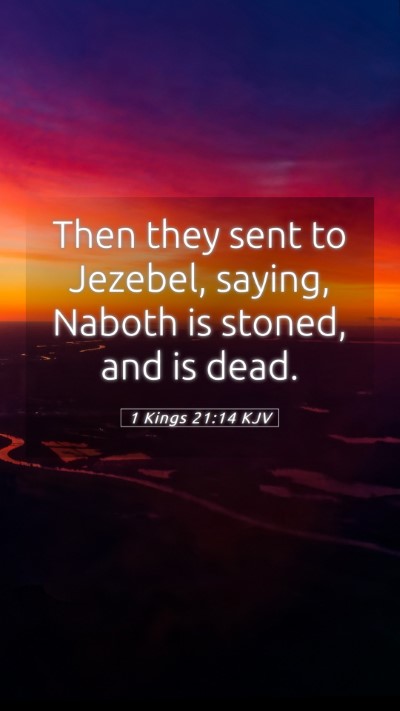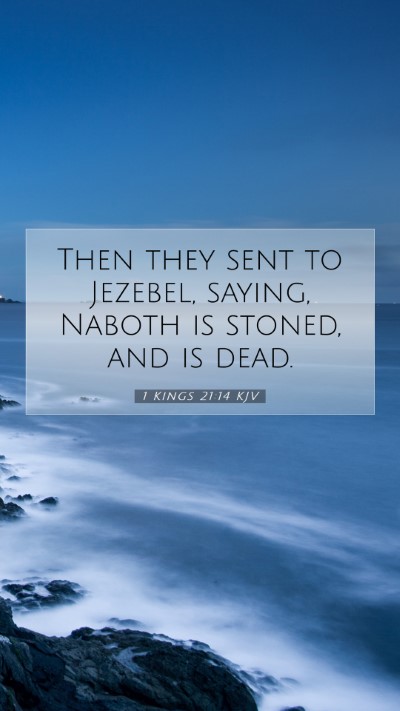Understanding 1 Kings 21:14
Bible Verse: 1 Kings 21:14 - "Then they sent to Jezebel, saying, 'Naboth is stoned, and is dead.'
Overview
This verse is situated within the context of Naboth's vineyard, where King Ahab desired Naboth’s vineyard, but Naboth refused to sell it, citing his loyalty to his ancestral inheritance. Jezebel’s ruthless actions culminate in Naboth's unjust death. Understanding this passage involves delving into themes such as injustice, abuse of power, and the consequences of moral corruption.
Commentary Insights
-
Matthew Henry:
Henry explains that Jezebel, in her ambition and ruthless pursuit of power, becomes a prime example of how corruption can lead to the vilest acts. She pleads a false case to get what she desires, thus illustrating the dangers of unchecked authority and the moral decay that can ensue.
-
Albert Barnes:
Barnes provides additional context by emphasizing the moral implications of the act. He reminds us that this incident shows the depths to which Ahab and Jezebel would sink to achieve their ends—murdering an innocent man to satisfy a selfish desire. His analysis leads readers to reflect on their personal ethics in light of such narratives.
-
Adam Clarke:
Clarke further expounds on the societal implications of this event. The death of Naboth symbolizes a broader theme of how sovereignty can serve as a cloak for tyranny when leaders lose sight of justice. He encourages readers to consider the importance of standing up against injustices, as Naboth did, even in the face of overwhelming opposition.
Key Themes and Interpretations
-
Abuse of Power:
This verse highlights the dangers of absolute authority in the hands of the wicked. Ahab and Jezebel symbolize leaders who misuse their powers for personal gain, showing a need for accountability and the moral obligation to protect the vulnerable.
-
Moral Corruption:
The willingness to kill Naboth portrays how far individuals can drift morally when blinded by desire. The text serves as a warning against letting personal affections dictate our actions, especially when they harm others.
-
The Role of the Innocent:
Naboth represents those who suffer due to the malicious intentions of others. His loyalty to God's commands and heritage brings forth a poignant lesson on integrity in the face of evil.
-
Justice and Retribution:
Though Naboth is wrongfully killed, this act sets into motion a series of divine judgments that ultimately result in consequence for Ahab and Jezebel. This highlights the biblical principle that God sees and remembers injustice, promising eventual retribution.
Application to Daily Life
1 Kings 21:14 challenges believers to reflect on their own lives regarding ethics and justice. It prompts individuals to:
- Stand up for the oppressed: Just as Naboth defended his rights, we are called to advocate for those who cannot defend themselves.
- Examine personal desires: Reflect on how personal ambitions might influence judgment and lead to unjust actions.
- Pursue justice: Engage in activities that promote fairness within communities, ensuring that authority figures are held accountable.
Related Bible Verses
- 2 Samuel 12:9 - Exposes the consequences of David’s sin and mirrors the righteousness that Naboth stood for.
- Micah 2:1-2 - Discusses the injustice of desiring fields and taking them from their owners, encapsulating themes mirrored in Naboth’s story.
- Matthew 5:10 - Blessed are those who are persecuted for righteousness' sake, similar to Naboth.
- Proverbs 22:22-23 - A stern warning against robbing the poor and oppressing those who are innocent.
Conclusion
In sum, 1 Kings 21:14 serves as a powerful reminder of the consequences of moral failures and the importance of integrity. The amalgamation of insights from various commentaries enriches our understanding of the text, fostering deeper reflection on biblical principles of justice and righteousness. As we grapple with scripture analysis, we are called to apply these lessons in our lives and communities, ensuring that we do not lose sight of ethical standards in our pursuits.


